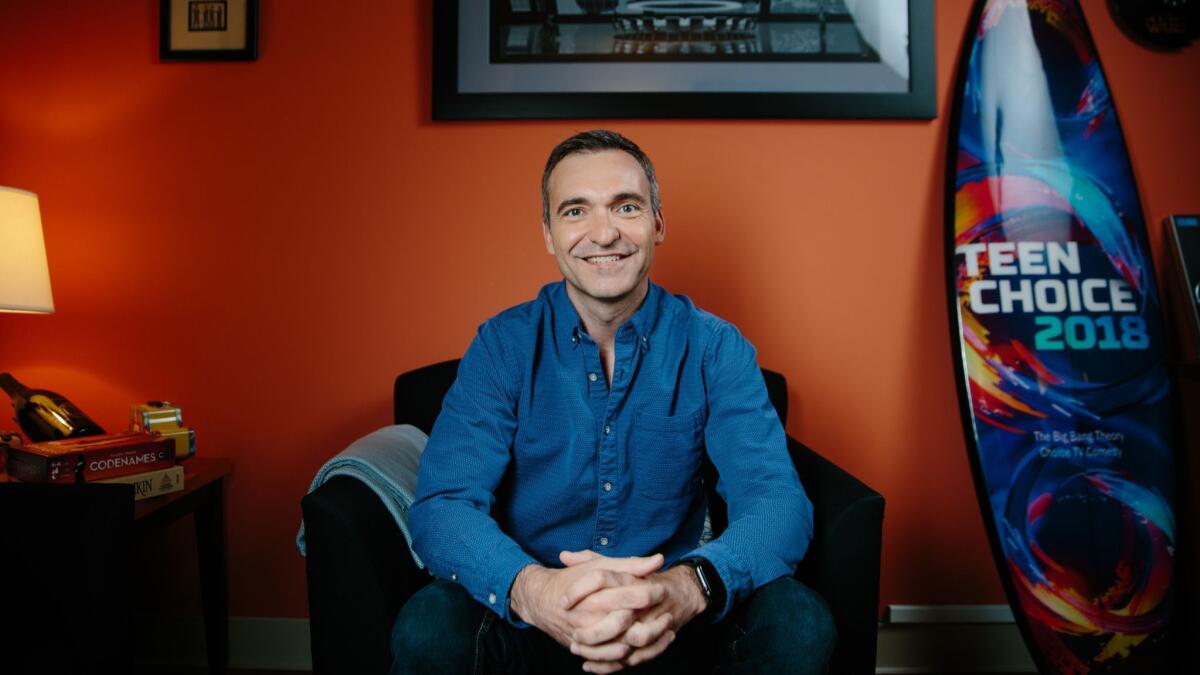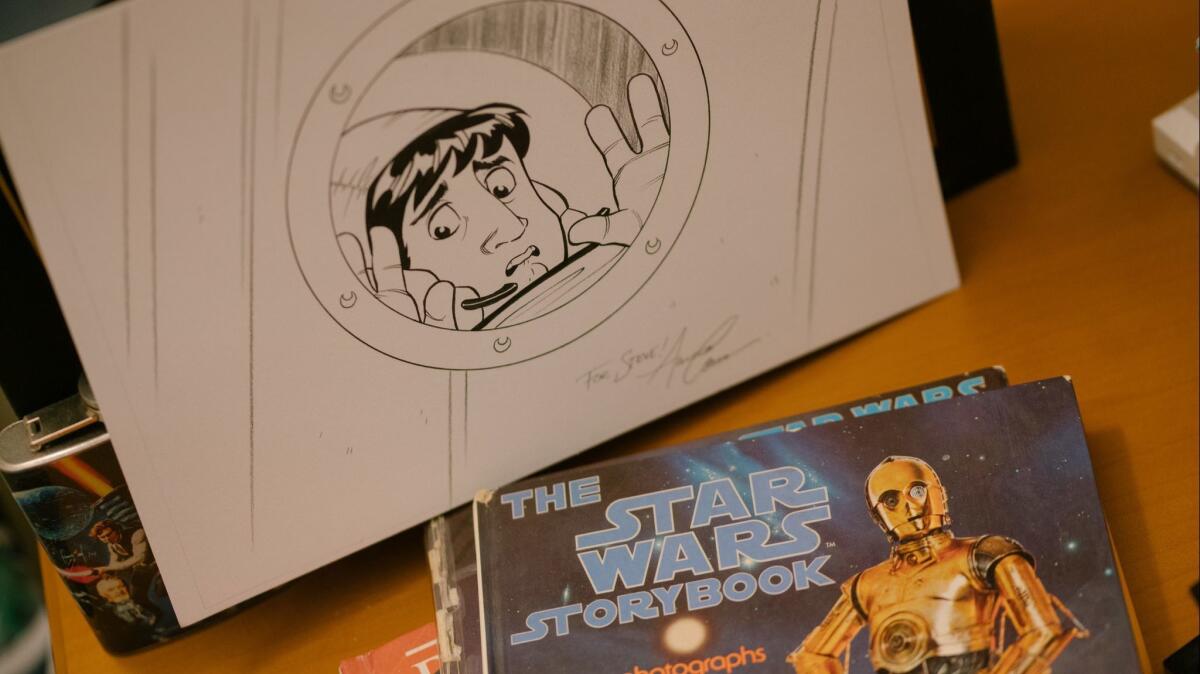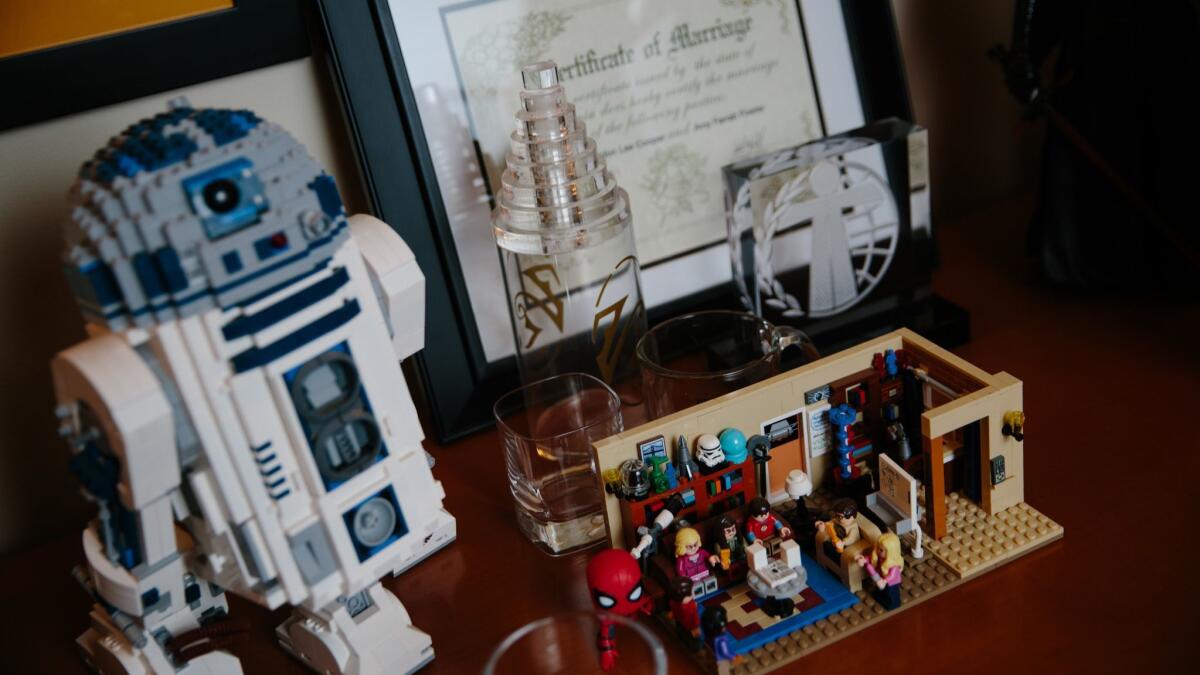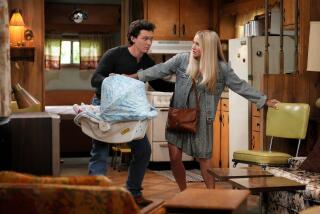âBig Bang Theoryâ showrunner Steve Holland on ending the series: âFinales are hardâ

In this series, Running the Show, The Times speaks with showrunners of your favorite TV programs about breaking into Hollywood, being the boss and more challenges of the job.
The running theme for the cast and crew on the set of the final season of âThe Big Bang Theoryâ is the idea that itâs the senior year of a 12-year sitcom school âwhich explains why the actors, writers and production team posted yearbook photos around the showâs soundstage on the Warner Bros. lot in Burbank.
Charged with leading the class to its graduation is Steve Holland, showrunner of the CBS comedy. The longest-running multi-camera sitcom will air a special hourlong series finale May 16.
A few weeks before the goodbye, sitting in his orange-hued Warner Bros. office, Holland is calm, not at all the ball of nerves you might expect for someone attempting to bring one of televisionâs most successful shows to a satisfying end.
âEveryone is trying to enjoy this as much as they possibly can,â he says. âI think weâre all incredibly aware of what a special thing this is.â
Holland joined the writing staff of âThe Big Bang Theoryâ at the beginning of its third season, working his way up to executive producer in Season 9 and then showrunner by Season 11 in 2017 when Steven Molaro stepped down to head the showâs spin-off, âYoung Sheldon.â Before his time on âThe Big Bang Theory,â Holland wrote for Nickelodeon hallmarks including âAll That,â âKenan & Kelâ and âiCarly,â as well as other broadcast sitcoms such as âLess than Perfectâ and âRules of Engagement.â
He worked closely with Molaro and Chuck Lorre, the showâs co-creator (with Bill Prady), to craft the showâs send-off and on this mid-April day is in the throes of writing the finale. âThe last scene weâve known for a while â actually, the last two scenes,â he says, âBut there was a lot of talk about what the first scene should be.â
Taking a break from the looming deadline, Holland talks about ending the show thatâs been such a bang for CBS, how his work on Nickelodeon was a good training ground, and how writing for comedy today has evolved.
On how Nickelodeon prepared him for prime time on broadcast
I worked on and off at Nickelodeon for probably 10 years, and with all those shows, you had a lot of freedom to write what you wanted. But also, these staffs werenât big, or the shows didnât have tons of money â so it felt like a boot camp. You just had to write constantly. There werenât 10 people there who were going to do it. There were three people or four people there, which just meant that you were constantly churning out drafts of things, stories of things, you know?
The goal was was the same. We never thought of it really as writing for kids. I mean, there were things that you obviously couldnât do because it was a kid show, but it was never a thing of writing down [to the audience]. If we thought it was funny and it was appropriate, we would put it in. And I think thatâs partly what made those shows so successful â it never felt like it was adults talking down to kids. I mean, we were all young too, but it was just us being goofy and silly and trying to make each other laugh.
On joining an already successful TV staff
Itâs intimidating, joining anything when a group of people have been together already. Luckily I wasnât alone. There were about three of us that started at the same time. But yeah, youâre coming into the show that other people have gotten up and running â this show that sort of has a very science-y, heady bent to it. But you have to sort of push past that and just try to see if you have anything to offer.
I had read Hawkingâs âBrief History of Timeâ to prepare. As you can see from the office, Iâm a âStar Warsâ guy. Iâm a comic book guy. I like science, but Iâm not a science guy. Iâm interested in it, I read about it, but thatâs not a thing that Iâm remotely an expert in. I also read [theoretical physicist] Richard Feynmanâs books. It was the most homework Iâve ever done for a show. Just to kind of walk in and have at least a groundwork understanding.

Iâve had this little âStar Warsâ book since I was probably six or seven. When we had Mark Hamill on the show, I had him sign it.
— Steve Holland, showrunner of âThe Big Bang Theory.â
On how writing for comedy is different now
I think the culture always shifts. I donât know if the actual writing process has changed, but in good ways you certainly become aware of things that maybe you didnât even consider 10 years ago.
Comedy is hard, and comedy doesnât always date super well because the culture moves, and because jokes that are fresh youâll see done over and over again. Itâs a continually evolving process, sort of, hopefully, like society is always a continually evolving thing. In a good way, that also opens up new stories and new opportunities to tell different kinds of stories because if nothing changed, you would run out. You would just tell the same things over and over again. But as long as people keep changing and shifting and growing, then it opens up new stories to tell.
On the afterlife of a TV show
[âThe Big Bang Theoryâ] is obviously on a much bigger scale, but my first job was on âAll Thatâ and âKenan and Kel.â I still meet people who are excited about that because it was a show that was a part of their life, that they had grown up on, and that they loved. Itâs really gratifying. When we were making âAll That,â none of us were thinking this was a legacy show that people were gonna be talking about 20 years from now. We were all so young and just trying to figure out how to do this thing. With âBig Bang,â certainly, youâre aware of it. Youâre aware of the impact that the show is having. And yeah, you just donât get to be a part of that, that many times in a career. Youâre lucky to get to be a part of it once. I hope itâs like an old friend that people are sad to see go, but that theyâll bump into in reruns, and theyâll be like, âOh, yeah, this was great.â And get to hang out and relive old times.
On whether binge-watching has changed TV storytelling
It doesnât really change the way we tell stories here. I love binge-watching things, but I do think part of the reason this show means a lot to a lot of people is that theyâve spent 12 years with it. Theyâve spent this amount of time, and I donât know that you get that same level of involvement when you watch a season in two days and then move on. Itâs just a different experience. Iâm not saying itâs better/worse because I do that as well. I guess itâs like an early relationship. Sometimes you have these relationships that are fun and passionate, intense and short-lived. And sometimes you have these. I donât know that those [shows] that you watch over four days, and then wait a year and watch it over four days are ever going to get into your DNA the way a show that youâve lived with...I think thereâs obviously room for both of those things, but I donât know if theyâre the same.

Is it a good time to be a TV writer?
It makes me feel desperately behind on all my TV viewing because thereâs so much out there. It makes me feel excited about the future in a way that you can tell any kind of story. There are so many different venues and outlets that you donât have to just have a show that hits this many people if you wanted. If you had something specific and weirder and quirky, and youâre like, âWell, this is only going to be for a couple of people,â thereâs probably a place where you can do that now. I donât think that was true 10 years ago.
On memorable finales
The âFriendsâ finale is a big one that I remember. Iâm a big âBuffy the Vampire Slayerâ fan â thatâs a great finale. Finales are hard; endings are hard. Especially ending something after 12 years when people have so many unsure specific ideas of what they would like to see. You canât just give everybody exactly what they want to see, but weâve talked a lot about finales, especially going into this year â good finales, and bad finales, and why some of them work and some of them donât.
I mean I remember watching the âMASHâ finale as a kid, and I donât even think that I was that big of a âMASH.â fan. I was fairly young, but it was such a big deal. It was a huge event, way more than anything weâll ever get again. I remember specific parts of it. Not to stress myself out more, but weâre aware that this is a big thing, and weâre aware that people have lots of expectations.
At some point, you have to try to set those aside a little bit, and sit down, and be like, âOK. These are our characters, this is our story to tell, and we get to tell it how we want to.â Hopefully, the fans really like what weâre doing with the finale. And Iâm sure some of them wonât or theyâll wish we did something else, or theyâll wish there was more to it, and I think thatâs only a good thing. It only means people are so invested in the show, and so passionate about these characters that they really care deeply about what happens to them.
Twitter: @villarrealy
More to Read
The complete guide to home viewing
Get Screen Gab for everything about the TV shows and streaming movies everyoneâs talking about.
You may occasionally receive promotional content from the Los Angeles Times.







